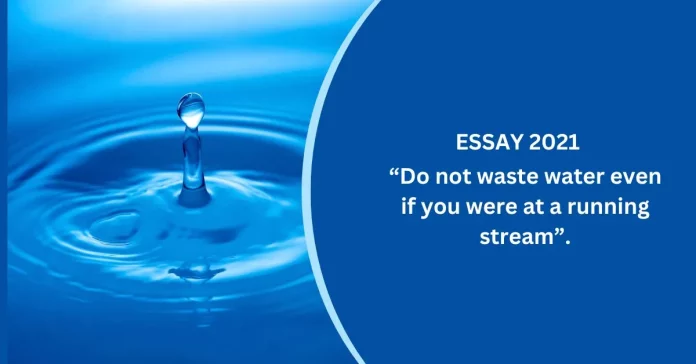Table of Contents
Thesis Statement
Despite the abundance of water in some regions, it is crucial to conserve and value this precious resource. Wasting water, even in the presence of a running stream, has significant environmental, economic, and social consequences that demand our attention and responsible actions.
Introduction
Water is an indispensable resource for all forms of life on Earth. It sustains ecosystems, supports agriculture, and fulfills our basic needs. However, the availability of clean and fresh water is not infinite. The global water crisis and the growing scarcity of water resources have brought the issue of water conservation to the forefront. It is crucial to recognize the importance of water conservation and avoid wasting water, even if we find ourselves near a running stream. This essay explores the reasons why wasting water can have detrimental effects and emphasizes the need for responsible water management.
Exposition: The Importance of Water Conservation
Water is often taken for granted, especially in regions where it appears to be abundant. However, the reality is that only a small percentage of the Earth’s water is accessible and suitable for human use. The global water crisis is a pressing issue affecting millions of people around the world. According to the United Nations, around 2.2 billion people lack access to safely managed drinking water services. Water scarcity is exacerbated by population growth, climate change, pollution, and inefficient water management practices.
Description: Wasting Water and its Consequences
Wasting water is a common occurrence in our daily lives, often due to a lack of awareness or disregard for its finite nature. Activities such as leaving taps running, excessive irrigation, and inefficient water use contribute to water waste. The consequences of such wasteful practices are significant. Environmentally, water waste depletes natural water sources, disrupts ecosystems, and threatens biodiversity. Economically, water scarcity and inefficient use lead to increased costs, agricultural losses, and limited economic development. Socially, water scarcity affects vulnerable communities, particularly women and children, who bear the burden of fetching water over long distances.
Argumentation: Reasons to Conserve Water Even at a Running Stream
Conserving water, even when surrounded by a running stream, is essential for several reasons. Firstly, it is a responsible action towards the environment and future generations. By valuing water and using it efficiently, we ensure its availability for years to come. Secondly, water conservation is closely linked to sustainable water management. Efficient use of water resources minimizes waste, reduces the need for costly infrastructure development, and helps maintain ecological balance. Lastly, individual actions have a ripple effect. When one person conserves water, it inspires others to follow suit, creating a collective impact on water conservation efforts.
Narration: Real-life Examples and Success Stories
Throughout the world, there are numerous examples of successful water conservation initiatives and inspiring stories of individuals and communities making a difference. From rainwater harvesting projects in arid regions to water recycling programs in urban areas, innovative approaches to water conservation have proven effective. Personal experiences of individuals adopting water-saving habits and implementing efficient water management practices serve as beacons of hope and demonstrate the positive outcomes that can be achieved.
Counterargument and Refutation: Addressing Resistance to Water Conservation
Despite the compelling arguments for water conservation, some individuals may resist the idea for various reasons. Common arguments include the perception of abundant water supply, inconvenience in adopting water-saving practices, and the belief that individual actions have little impact. However, it is crucial to address these counterarguments and provide counterpoints. By highlighting the finite nature of water resources, showcasing the ease of adopting water-saving habits, and emphasizing the collective impact of individual actions, the resistance to water conservation can be overcome.
Conclusion
In conclusion, wasting water, even when near a running stream, is a detrimental practice that should be avoided. The importance of water conservation cannot be understated in the face of the global water crisis and the need for sustainable water management. By valuing and conserving water, we contribute to environmental preservation, economic stability, and social equity. Every individual’s actions matter in the collective effort to ensure water security for current and future generations. Let us recognize the significance of water conservation and pledge to protect this precious resource for a sustainable and thriving world.


